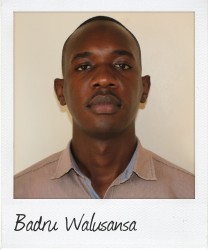“Young professionals need mentorship”
April 18th, 2018 In the world of employment, there are many young professionals who aspire to positively impact society, writes Badru Walusansa, 26, a Commonwealth Correspondent from Kampala in Uganda. He calls for mentorship programmes to help nurture their skills.
In the world of employment, there are many young professionals who aspire to positively impact society, writes Badru Walusansa, 26, a Commonwealth Correspondent from Kampala in Uganda. He calls for mentorship programmes to help nurture their skills.
Notwithstanding the surging youth unemployment, most organisations boast of youthful staff. This is attributed to the creativity, shrewdness and tenacity embedded in young people. However, many young professionals risk missing a chance to boost their careers due to limited mentorship programmes, especially at places of work.
Mentorship is an indispensable tool for preparing, guiding and motivating young professionals during the course of their career development. It instills a sense of confidence among young staff and its spillover is reflected in terms of responsibility, productivity and ethical behavioral exhibited by those who have had mentorship opportunity. Conversely, young professionals who have had no chance to be mentored are likely to have less focus and direction in their career trajectory.
It’s no surprise that some of today’s young professionals value money more than the skills and knowledge accumulated over time through mentorship. As a result, some end up being embroiled in the lure of misconduct and corruption in the workplace. The Uganda Youth Survey Report (2016) revealed that 55 per cent of youth admire those who make money through hook or crook, (including hustling) whereas 33 per cent believe corruption is profitable.
Recently, the Permanent Secretary of the Ministry of Health, Dr. Diana Atwine, decried the lack of close interaction between senior medical doctors and medical interns at Mulago Hospital. This in itself creates a knowledge and skills gap between senior experienced personnel and young professionals. Perhaps that’s why young professionals grapple with acquiring experience which could have been transmitted through mentorship.
Additionally, senior experienced personnel should embrace passing on skills and knowledge. This can be achieved through mentoring either at their places of work or outside the working realm. It should also be noted that mentorship presents mutual benefits to both the mentor and mentored. For instance, the mentor often has sufficient knowledge and skills to share with a youthful colleague, however, on the other hand the one being mentored is also in position to share a new perspective with the mentor.
It is also important to understand that mentorship doesn’t exist in isolation. It starts at the family level. Our parents or guardians should actually be the greatest role models or mentors that we can ever have. Therefore, our parents or guardians have the primary obligation to shape us into responsible persons before we move on to school and work settings. The same home that teaches a child to pray can still teach him or her certain intrinsic values such as honesty, trust and humility, which are all vital virtues in our professions.
As a civilised society we must religiously encourage mentorship and attach value on it as a practice. For example, senior experienced personnel should include mentorship experience on their resumes along with other common achievements like academics and work experience. Interview panels should be allowed to ask a candidate how many young professionals they have mentored in their professions as lawyers, statisticians, doctors, teachers and business entrepreneurs, among others. Candidates must as well mention the kind of knowledge and skills passed along in mentorship and before we know it, we shall be contributing to knowledge conservation and sustainability to the generations to come.
Government institutions, companies and other organizations must hugely invest in mentorship programmes for young staff as a way of enabling them to improve on their knowledge as well as that of the organisation. Furthermore, mentorship helps young professionals to deal with the challenges that they often encounter at work or on a personal level. Therefore, deliberate efforts should be made to ensure that young professionals are placed under the watch of senior staff in order to enhance career and personal development.
Even at the national level, we must prepare young people for leadership. This can only be feasible through mentorship.
Reach me at badruwalu@gmail.com
photo credit: Christine Schmitt 365-003 Who’s the boss? via photopin (license)
………………………………………………………………………………………………………………
About me: I am a human rights activist, academic and writer in the local dailies. I was part of Uganda’s largest election observation group, CEON-Uganda and currently work as a Project Assistant M&E at the Legal Aid Service Providers’ Network (LASPNET). My passion is in writing and I have authored several articles on different topics in the Weekly Observer, Daily Monitor, New Vision and Independent Magazine.
…………………………………………………………………………………………………………………
Opinions expressed in this article are those of the author and do not necessarily represent the views of the Commonwealth Youth Programme. Articles are published in a spirit of dialogue, respect and understanding. If you disagree, why not submit a response?
To learn more about becoming a Commonwealth Correspondent please visit: http://www.yourcommonwealth.org/submit-articles/
……………………………………………………………………………………………………………






